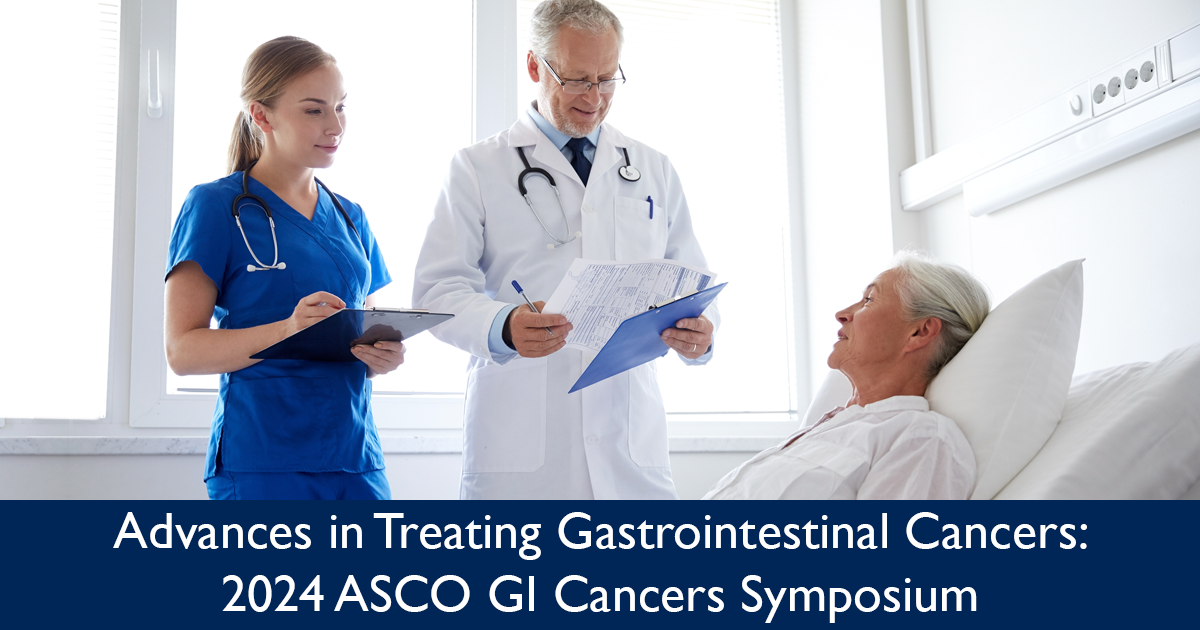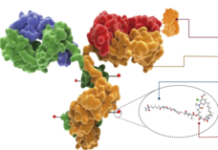
The 2024 American Society of Clinical Oncology (ASCO) Gastrointestinal Cancers Symposium will be held January 18 to 20 in San Francisco, California. This meeting draws together experts from around the world to discuss new ways of treating cancers that affect the body’s gastrointestinal tract, which is the bodily system involved in swallowing and digesting food, absorbing nutrients, and removing waste from the body.
Below are summaries of 3 studies that will be presented at the symposium:
You can learn more about research from this symposium by following the #GI24 hashtag on X, formerly known as Twitter.
Adding tiragolumab to atezolizumab and chemotherapy helps some people with esophageal cancer live longer
Who does this study affect: People with locally advanced or metastatic esophageal squamous cell carcinoma (ESCC) that cannot be treated with surgery (unresectable)
What did this study find: Results from the phase 3 SKYSCRAPER-08 study show a new drug called tiragolumab plus atezolizumab (Tecentriq) and chemotherapy improved overall survival and progression-free survival for people with locally advanced or metastatic ESCC that could not be treated with surgery.
ESCC is the most common type of esophageal cancer. An estimated 604,100 people were diagnosed with esophageal cancer worldwide in 2020, and 80% of all cases were ESCC. About half of all ESCC cases are found in China. ESCC is a difficult disease to treat successfully in its more advanced stages because there are limited treatment options.
Researchers wanted to learn if the combination of tiragolumab, atezolizumab, and chemotherapy could improve outcomes for people with ESCC. Tiragolumab is a new immunotherapy drug that targets TIGIT receptors found on certain cancer cells. Atezolizumab is a type of immune checkpoint inhibitor that blocks PD-1 proteins on the surface of cancer cells to boost the body’s natural defenses to fight cancer. The current first-line standard of care for systemic therapy for people with ESCC is an anti-PD-1 inhibitor plus chemotherapy.
In this study, 461 patients were randomly assigned to receive either the combination of tiragolumab, atezolizumab, and chemotherapy (229 people) or chemotherapy and a placebo (232 people). They had either locally advanced, recurrent, or metastatic ESCC that could not be treated with surgery. Because most cases of ESCC occur in Asia, all the participants came from 5 countries in Asia, including mainland China, Republic of Korea, Thailand, Taiwan, and Hong Kong.
The study found that:
-
The median overall survival was 15.7 months for people taking tiragolumab, atezolizumab, and chemotherapy. The median is the midpoint, meaning half of the participants lived longer than 15.7 months and half lived less than 15.7 months. In comparison, the overall survival rate was 11.1 months for people in the placebo and chemotherapy group. Overall survival is how long patients survive after a diagnosis.
-
The median progression-free survival was 6.2 months for people taking the tiragolumab combination and 5.4 months for people taking the placebo and chemotherapy. Progression-free survival is a measure of how long a treatment stops cancer from growing or spreading.
-
The overall response rate was 59.7% in the tiragolumab combination group and 45.5% in the placebo and chemotherapy group.
The most common side effects experienced by the group receiving tiragolumab, atezolizumab, and chemotherapy were a rash (38.6%), hepatitis (liver inflammation; 35.1%), hypothyroidism (underactive thyroid; 17.5%), infusion-related reaction (17.5%) and pneumonitis (lung inflammation; 7.5%).
What does this mean for patients? A combination of tiragolumab, atezolizumab, and chemotherapy helps people with metastatic or locally advanced unresectable ESCC live longer than chemotherapy alone.
“Esophageal squamous cell carcinoma has a significant impact on patients’ functioning and quality of life, including symptoms such as trouble sleeping, weight loss, anxiety and depression, pain, and difficulty swallowing. Given the demographics of esophageal cancer, the study was intended to focus on the Asian population.”
— lead study author Chih-Hung Hsu, MD, PhD
National Taiwan University Hospital
Taipei, Taiwan
Who does this study affect: People diagnosed with colorectal cancer.
What did this study find: Research from the GALAXY clinical trial, which is part of a larger Japanese study called CIRCULATE-JAPAN, shows that a blood and tissue test can help identify which people may benefit from chemotherapy after colorectal cancer surgery. Chemotherapy after surgery is called adjuvant chemotherapy.
Surgery is the most common treatment for colorectal cancer. After surgery, microscopic areas of cancer may remain in the body. These areas are too small to be seen on imaging tests but may eventually grow and spread, leading to a recurrence, which is when cancer comes back after treatment. Doctors can try to prevent recurrence after surgery by offering adjuvant chemotherapy, but they do not have a proven way to know which patients will benefit from this additional treatment after surgery.
In the GALAXY clinical trial, the researchers tested patients’ blood and tissue for the tiny particles of leftover cancer that cannot be seen by imaging tests. This test looks for fragments of cancer DNA that is circulating in the blood and tissue. This is called circulating tumor DNA or ctDNA. This kind of test is sometimes referred to as a liquid biopsy. If cancer fragments are found, it is called molecular or minimal residual disease or MRD. In this study, the researchers observed whether liquid biopsy results could be used to guide the decision whether adjuvant chemotherapy should be given after surgery.
There were 2,998 participants in the entire study. The participants were mostly East Asian, and the majority of them were Japanese. There were 415 participants with stage I cancer, 901 with stage II, 1,231 with stage III, and 451 with stage IV. After surgery, 1,130 patients received adjuvant chemotherapy and 1,868 patients did not. All patients received liquid biopsy tests and computed tomography (CT) scans at regular intervals.
Liquid biopsy results were available for 2,860 participants. Among those tested, 369 (about 3%) tested positive for ctDNA after surgery. The researchers found that individuals who remained ctDNA positive through 6 months of testing were more than 5 times more likely to have a recurrence than those whose follow-up tests eventually showed no ctDNA.
There were 240 participants who were ctDNA positive and received adjuvant chemotherapy, and about 2 of every 3 patients (about 66%) eventually showed no ctDNA. Among those who eventually showed no ctDNA after chemotherapy, 58% remained ctDNA negative and 42% became ctDNA positive again.
The researchers also calculated the disease-free survival (DFS) at 2 years for the participants. DFS is the amount of time after treatment when patients are alive and have not had a recurrence. For those who remained ctDNA negative after adjuvant chemotherapy, the DFS was around 90%, compared to about 2% for those who became ctDNA positive again after adjuvant chemotherapy. The researchers also found that if adjuvant chemotherapy decreased ctDNA levels by 50% or more at 6 months, then the DFS was 51%. If the chemotherapy decreased ctDNA by less than 50%, then the DFS was 29%.
What does this mean for patients? This study used liquid biopsy to observe the effectiveness of chemotherapy to treat ctDNA-positive colorectal cancer after surgery. With the insights from this liquid biopsy test, research is helping identify who may or may not benefit from adjuvant chemotherapy.
“These findings may allow us to spare a considerable number of ctDNA-negative patients the toxicity of chemotherapy without compromising their long-term survival and identify ctDNA-positive patients who should receive chemotherapy. Monitoring ctDNA during surveillance allows for early detection of cancer recurrence, which can potentially enable early intervention, improve the chances of a cure, and/or extend survival.”
— lead study author Hiroki Yukami, MD
Osaka Medical and Pharmaceutical University
Osaka, Japan
Who does this study affect: People with stage IIA colon cancer.
What did this study find: The NRG-GI005 clinical trial, also known as COBRA, ended early because it was not able to show that liquid biopsy was useful in guiding decisions whether patients should get adjuvant chemotherapy after surgery for stage II colon cancer. NRG-GI005 is a randomized, controlled clinical trial supported by the U.S. National Cancer Institute (NCI).
For many people with stage II colon cancer, surgery alone is enough to cure the disease. However, if fragments of cancer DNA remain in the body after surgery, the cancer may eventually recur. For stage IIA colon cancer, which has not spread beyond the colon, the risk of recurrence is generally low and ASCO does not recommend adjuvant chemotherapy.
This study included 635 people with stage II colon cancer that had been treated by surgery. The participants did not have indications that their disease had a high risk of recurrence, and typically the doctor would recommend close observation for these patients rather than adjuvant chemotherapy. The participants were divided into 2 groups. One group (318 people) would be closely observed. The other group (317 people) would receive chemotherapy if the liquid biopsy detected ctDNA in the blood. All would be tested with liquid biopsy in the study.
In the first round of liquid biopsy tests after surgery, there were 16 participants whose blood tested positive for ctDNA. Of those, 7 patients were in the close observation group and 9 were in the adjuvant chemotherapy group. After 6 months, the researchers tested whether there was still ctDNA in the blood of these participants. Among those who were closely observed, 3 patients (43%) had cleared the ctDNA from the blood. Among those who received adjuvant chemotherapy, 1 patient (11%) had cleared the ctDNA. Because this beginning analysis did not show that the chemotherapy was equal to or better than close observation after surgery, the study was ended.
What does this mean for patients? For people with low-risk stage IIA colon cancer, liquid biopsy may not be an effective way to decide whether chemotherapy is helpful after surgery for preventing recurrence.
“The real-world applications of the liquid biopsy for patients with gastrointestinal cancers continue to evolve rapidly. While the results of this specific trial are disappointing, continued enhancements to ctDNA assay characteristics and performance coupled with the unmet clinical needs of patients keep future ctDNA trials highly relevant for the foreseeable future.”
— lead study author Van K. Morris, MD
University of Texas MD Anderson Cancer Center
Houston, Texas
Like what you’ve read here at Cancer.Net? Sign up for our monthly Inside Cancer.Net e-newsletter and follow Cancer.Net on Facebook and Twitter for news about the latest in cancer care and treatment.








